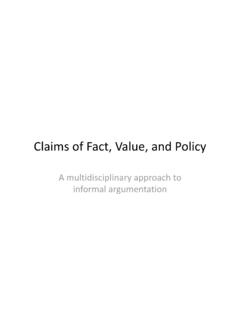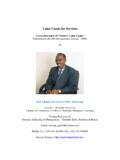Transcription of How HR Can Add Value? - whrppk.com
1 how hr can add value ? Today, no market is more competitive than the market for employees. The challenge for organizations is not only to make potential employees aware of their company as a good place to work, and bring the best applicants successfully through the recruitment and hiring process, but to retain them, ensure their understanding of the company s goals and commitment to them, and provide the environment and structures to motivate them to give of their best. In today's rapidly changing and highly competitive environment, the human resource function plays an increasingly important role in an organization's ultimate success or failure. Where success was once dependent upon an organization's ability to discover and manage natural resources, success today goes to the organizations that most effectively discover and manage their human resources.
2 Leading the people is not just for creating a feel good atmosphere all around, it is about infusing the right attitudes and behaviors required for winning fair and square at marketplace. Leaders communicate the organizational values to influence people behaviors. Communication is the keyword here. And what better way to communicate the values than making the values visible through their actions. In other words leaders create coherence between their words and behaviors. The clarity on values enables people to live by them too. It is through these values that leaders influence organizational culture. In their must-read book The HR value Proposition , Professors Dave Ulrich and Wayne Brockbank outline a practical approach for HR Professionals to add business value . They state HR Professionals add value when their work helps someone reach their goals. It is not the design of a program or declaration of policy that matters most, but what recipients gain from these actions.
3 In a world of increasingly scarce resources, activities that fail to add value are not worth HR value proposition means that HR practices, departments, and professionals produce positive outcomes for key stakeholders employees, line managers, customers, and investors . Unfortunately, in some organizations HR is still not seen as an occupational group that delivers value to key stakeholders. The value created by the HR function is frequently questioned by Senior and Line managers. This reflects how many human resources functions are perceived to be out of step with the needs of businesses. Human Resources is under increasing pressure to move from transaction management and oversight responsibilities to a strategic function that positively impacts organizational results. Implementing innovations to your organization isn t just about doing HR better, but also about delivering business value .
4 The traditional factors that executives typically consider in calculating return on investment - reduced administrative costs and HR staff-to-employee ratio, for instance - are limited. Improving the entire company s productivity is the priority. There s a growing consensus among HR Professionals that the modern HRMS has already squeezed all the inefficiencies possible from transactions and reduced HR staff as much as it can. Now, as HR moves processes to the web, the measures of success will be increased productivity and added business value . Traditionally, HR has been tasked with much of the responsibility for these critical tasks. Low morale in the company? Ask HR what they re doing about it. In fact, line management has at least as big a role to play as HR in ensuring a workforce can deliver competitive success. A genuine partnership between the two is the ideal. But, as many HR Professionals agree, this transformation is not a simple task.
5 How do you determine what a strategic HR function does and how can your HR organization make that fundamental shift from traditional HR group to strategic player in the business? Though organizations widely recognize the need to attract, manage and develop people, today HR Professionals must strive to do much more. They must enable their organization to build global HR networks in order to expand and prosper in the international arena. They must also develop human resources that continually build competitive advantage in an ever-changing environment. And, they must add value to their organization's distinctive competencies How I Play My Role? Most companies today face declining revenues, increasing costs, shrinking market share and depleting shareholder value . What does HR do in this situation? How will HR play its role to truly bring sustainable value to the company?
6 HR buying decisions are now much more sophisticated than they were five years ago. Cost reduction is still a priority but companies are finding they can get more value added by tapping into the expertise and technology that HR Professionals can offer to improve the HR service and free up internal resources to support implementation of the business strategy. HR can add value to the organization in the aspect of achieving effective employee relations by dissemination of information to all employees in a structured and timely manner so that they can understand what their organization is trying to do, and what are needs to do in order to achieve its objectives. In today s new business order, management is looking to HR to lead initiatives that improve workforce performance, productivity, and satisfaction. HR can intervene and add value throughout the enterprise it serves by helping it achieve these goals: Development: aggressive goals, improving innovation productivity, creating more new products and services, more new applications, better ideas.
7 Understand your customers business Focus on helping your customers achieve their goals Marketing: outrageous objectives, higher productivity, more customers, more profitable sales, fewer customer complaints. Link HR plans/goals to customer needs Production: higher standards, increased productivity, better product quality, more through put, fewer disputes. Distribution: step-increased objectives, increased productivity, reduced service cycle-time, reliable on-time delivery, better image. Be proactive Find solutions, not barriers Understand broader environment (labor, politics, legislation, technology) Allow time for strategic thinking As always, if a service is not worth to the customer what it costs to provide, then either costs need to be reduced to make them less than the value produced, or the service needs to be dropped until a less costly or more valuable approach can be developed.
8 The key is to pick a strategy and take action to measure HR s value , whether in the form of a claim, a return on investment, a redesigned HR function, or a complete transformation to a value adding function. How Will I Ensuring? Human Resource Departments add value to a business by ensuring:- How do the processes such as staffing, hiring, communication, and compensation; that govern how work is done, enhance organizational competitiveness, and add value ? Ensure recruiting the right caliber and grade of existing and new employees by determining job descriptions, people profiles and skills criteria to match job role. Ensure personnel policies and procedures are followed consistently by all departments within a company. Ensure who is responsible for Human Resources work? To what extent do managers view themselves as HR managers as well as Operational managers?
9 Ensure when and how should Human Resources be proactive, reactive, or anticipatory? Ensuring that staff ratios are compatible to the projected cost base and taking intervention action where recruitment gets 'overblown'. This ensures that a company employs the right volume of people required; maintaining the company margins, which in turns ensures the continuing viability of the company. Offers impartial personnel function that restricts and controls all personnel within the business to manage people within the correct legal context and not allowing them to inadvertently side step employment law and legislation. Ensures that internal promotion and selections are carried out in a fair and equitable manner using the same base criteria for each candidate. This in turn means the right people get promoted which enhances the role effectiveness and increased efficiency of the job delivery.
10 Ensure that pay grades are equitable and reviewed with similar type roles in equivalent external organizations to keep attracting the best candidates. Ensure the financial contributions of Human Resources. Ensure how do HR systems enhance the intellectual and managerial capacity of the organization? HR Professionals must be knowledge experts of external business realities before they can frame, execute, and create substantive value through even the basic of HR agendas. What abilities do we need so that we can understand and respond to short-term and long-term market demands? How do we invest in HR practices that deliver business results? How do we organize HR activities to deliver maximum value ? How do we create an HR strategy that sets an agenda for how HR will help our company succeed? When HR Professionals respond to these questions, they will know why others would benefit by listening to them, because they will be delivering real value -and they will know what that value is.






